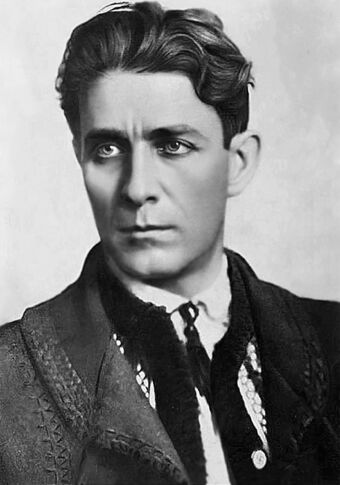For My Legionaries: The Iron Guard (1936), Politics
Famous Corneliu Zelea Codreanu Quotes
“The young man who joins a political party is a traitor to his generation and to his race.”
For My Legionaries: The Iron Guard (1936), Politics
For My Legionaries: The Iron Guard (1936), Nation and Culture
For My Legionaries: The Iron Guard (1936), Nation and Culture
For My Legionaries: The Iron Guard (1936), Nation and Culture
Corneliu Zelea Codreanu Quotes about people
For My Legionaries: The Iron Guard (1936), Politics
For My Legionaries: The Iron Guard (1936), Politics
For My Legionaries: The Iron Guard (1936), Politics
For My Legionaries: The Iron Guard (1936), Nation and Culture
For My Legionaries: The Iron Guard (1936), Nation and Culture
For My Legionaries: The Iron Guard (1936), Jewish Problem
Corneliu Zelea Codreanu: Trending quotes
For My Legionaries: The Iron Guard (1936), Politics
“Wherever the Legionary’s hand and soul show up, a garden appears.”
For My Legionaries: The Iron Guard (1936), The Legion
For My Legionaries: The Iron Guard (1936), Politics
Corneliu Zelea Codreanu Quotes
For My Legionaries: The Iron Guard (1936), Religion
For My Legionaries: The Iron Guard (1936), Politics
For My Legionaries: The Iron Guard (1936), Politics
For My Legionaries: The Iron Guard (1936), Nation and Culture
For My Legionaries: The Iron Guard (1936), Religion
For My Legionaries: The Iron Guard (1936), Nation and Culture
For My Legionaries: The Iron Guard (1936), Nation and Culture
For My Legionaries: The Iron Guard (1936), Politics
For My Legionaries: The Iron Guard (1936), Religion
For My Legionaries: The Iron Guard (1936), Jewish Problem
For My Legionaries: The Iron Guard (1936), Politics
For My Legionaries: The Iron Guard (1936), Jewish Problem
For My Legionaries: The Iron Guard (1936), The Legion
The Nest Leader's Manual (1933)
"I await the resurrection of my Fatherland and the destruction of the hordes of traitors," etc.
For My Legionaries: The Iron Guard (1936), The Legion
For My Legionaries: The Iron Guard (1936), Jewish Problem
For My Legionaries: The Iron Guard (1936), Jewish Problem
On the form of government he plans on creating.
For My Legionaries: The Iron Guard (1936), Politics
For My Legionaries: The Iron Guard (1936), The Legion
For My Legionaries: The Iron Guard (1936), Nation and Culture
For My Legionaries: The Iron Guard (1936), Nation and Culture
“Mussolini has destroyed communism and Freemasonry; he implicitly declared war upon Judaism too.”
For My Legionaries: The Iron Guard (1936), Jewish Problem
For My Legionaries: The Iron Guard (1936), Nation and Culture
“Romania is dying because of a lack of men, not a lack of programs.”
For My Legionaries: The Iron Guard (1936), Politics
For My Legionaries: The Iron Guard (1936), Nation and Culture
For My Legionaries: The Iron Guard (1936), Jewish Problem
For My Legionaries: The Iron Guard (1936), Politics
For My Legionaries: The Iron Guard (1936), Politics
For My Legionaries: The Iron Guard (1936), Politics
“We will kill in ourselves a world in order to build another, a higher one reaching to the heavens.”
For My Legionaries: The Iron Guard (1936), Religion
For My Legionaries: The Iron Guard (1936), Politics
For My Legionaries: The Iron Guard (1936), Jewish Problem
For My Legionaries: The Iron Guard (1936), Politics
For My Legionaries: The Iron Guard (1936), Politics
See the sections on A.C. Cuza and Nicolae Paulescu.
For My Legionaries: The Iron Guard (1936), Jewish Problem
For My Legionaries: The Iron Guard (1936), Nation and Culture
I answer: "The previous elite."
For My Legionaries: The Iron Guard (1936), Politics
For My Legionaries: The Iron Guard (1936), Politics
For My Legionaries: The Iron Guard (1936), Jewish Problem
For My Legionaries: The Iron Guard (1936), Politics
The Nest Leader's Manual (1933)
For My Legionaries: The Iron Guard (1936), Jewish Problem
For My Legionaries: The Iron Guard (1936), Nation and Culture
For My Legionaries: The Iron Guard (1936), Politics
For My Legionaries: The Iron Guard (1936), Politics
For My Legionaries: The Iron Guard (1936), Politics
For My Legionaries: The Iron Guard (1936), The Legion
For My Legionaries: The Iron Guard (1936), Nation and Culture
For My Legionaries: The Iron Guard (1936), Jewish Problem
For My Legionaries: The Iron Guard (1936), Politics
